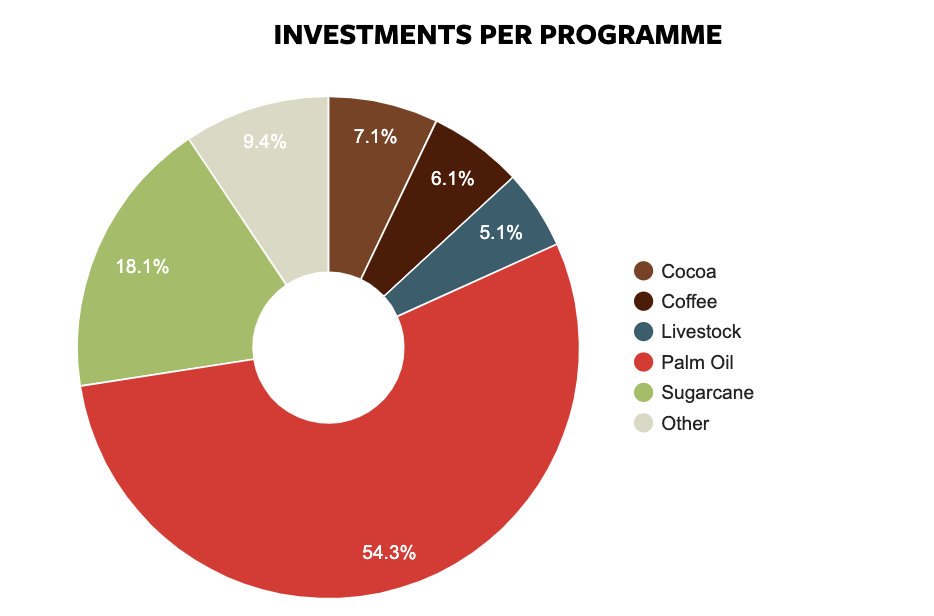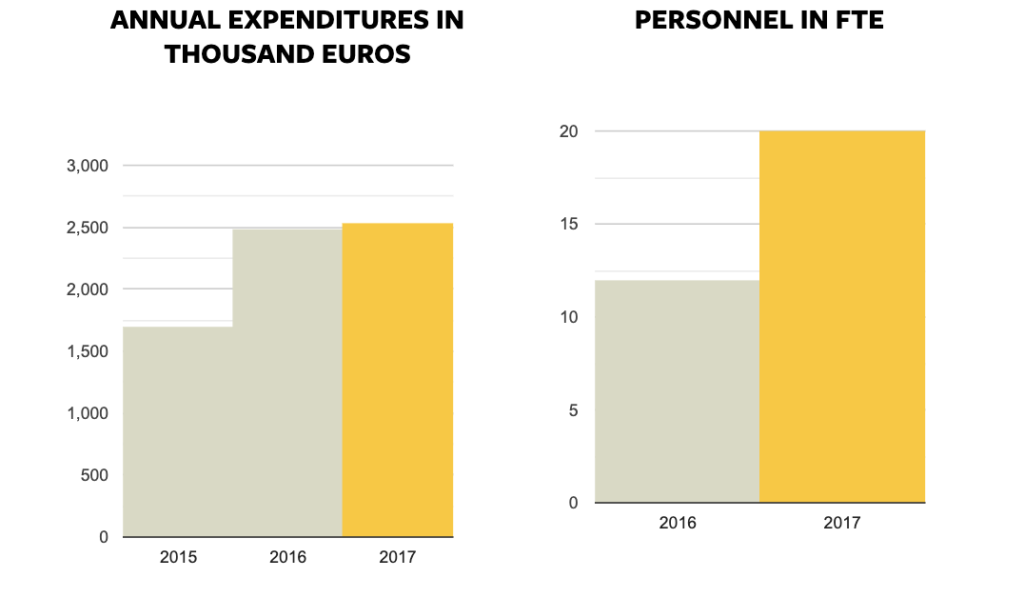Demand for cocoa from Mesoamerica, the potential of cocoa agroforestry systems to support sustainable landscapes, and job creation for women and youth, have stimulated investment strategies for cocoa production and value-addition across the region. In Honduras and Nicaragua, Solidaridad invests in best practices, access to improved varieties and technologies, and the development of investment models to facilitate sustainable growth. In Guatemala, Solidaridad supports young Q’eqchi women through the Women in Agroecology Leadership and Conservation Programme.

True Price helps organizations improve their social and environmental impacts and has validated Solidaridad’s climate-smart coffee renovation model developed in Chiapas, Mexico. It reported significant environmental, economic and social gains. A financial model to support the implementation of climate-smart practices is under development, attracting necessary investment to scale and accelerate adoption in Chiapas. Solidaridad is also active in national coffee platforms in Honduras and Nicaragua, with the aim to address critical issues affecting the performance of coffee including the impacts of climate change in coffee.

Livestock production is a driver of deforestation but also contributes to smallholder livelihoods. Through improvements in silvopastoral systems, it is possible to reduce greenhouse gas emissions and increase productivity. In partnership with CIAT, the sustainable landscapes “PASOS” initiative successfully improved livestock production in the Region Autónoma del Costa Caribe Sur. Solidaridad hopes to replicate the Nicaragua success of PASOS in Honduras and Mexico.

The Mesoamerican Palm Oil Alliance consolidated activities in capacity building, and the formalization of strategic partnerships with the private sector, government, civil society and producer organizations. Achievements include an RSPO National Interpretation and the development of a smallholder-inclusive business model in Nicaragua. Solidaridad is working with innovative partnerships to establish an RSPO Compensation Fund in Guatemala, launched 10 smallholder Farmer Field Schools in Mexico and reached palm oil sector engagement at the landscape level in Honduras and Nicaragua.

PanameriCaña, a regional sustainable sugar platform, experienced high growth in 2017. It engaged 25 mills in Mexico, Honduras, Nicaragua, El Salvador and Haiti. Efforts were focused on building baseline assessments of mill performance, and the development of work plans to close gaps related to sustainability standards. Solidaridad’s team of industry experts continue to support mills and field improvements in environmental, social, labour, occupational safety, health performance, productivity, and smallholder and worker outreach.

DEVELOPMENTS
Despite political turmoil and ongoing high levels of insecurity, 2017 was a year of breakthroughs and growing cross-sector and cross-boundary engagement in Mesoamerica and the Caribbean. The connection between producers, civil society, government and private sector players were strengthened. In addition, Solidaridad expanded its core team through the addition of specialists in impact innovation, digital solutions, gender and social inclusion, and climate innovation. Solidaridad also expanded the PanameriCaña and Mesoamerican Palm Oil Alliance with technical teams and knowledge experts.
At a national and regional level, multi-stakeholder platforms deepened and expanded dialogue and consensus-building on sector-specific and landscape level priorities. After years of cultivating private sector engagement for improvements in social, environmental and economic performance, significant strides are being taken to go beyond certification and make investments in core activities. This is being done to build impact investment models and compensation scheme innovations. In addition, robust mobile technology is being introduced to enhance organizational decision-making and track progress on Sustainable Development Goals and Nationally Determined Contributions.
In 2017, Solidaridad leveraged palm oil sector needs and sustainability goals to introduce sustainable landscape initiatives in Honduras and Nicaragua. It introduced biodiversity monitoring and management programmes to palm oil producers in Guatemala and linked high conservation areas to palm oil bio-corridor and biodiversity enhancements.

ACHIEVEMENTS
Robust national and regional learning exchange platforms, including PanameriCaña, Mesoamerican Palm Oil Alliance, Sustainable Landscapes / Paisajes Sostenibles, and the development of climate-smart and sustainable landscape investment models, increased the speed and scale of knowledge, tool and innovation transfer. The platform model has grown co-financing commitments and increased multi-stakeholder participation. It has generated new opportunities for the transition to a sustainable economy. Solidaridad’s synergistic theories of change are reflected in the following achievements:
- Mexican and Central American sugar sector players expanded knowledge related to the issue of chronic kidney disease and causal factors such as thermic stress and chronic dehydration. In addition, various water-rest-shade protocols are being applied in mills across the region. PanameriCaña supports mills, producer associations and farmer unions on the design and implementation of occupational safety and health interventions to reduce the risk of chronic kidney disease and thermic stress and chronic dehydration.
- Participation of regional sugar mills in PanameriCaña increased from two to 25 in 2017. The first smallholder sugarcane productivity project was launched in Haiti with promising results viewed in the first six months of intervention.
- A total of 10 Farmer Field Schools with 60 demonstration plots for Mexican smallholder oil palm producers were launched. In addition, a mixed livestock and cacao Farmer Field School methodology was established in El Rama, RACCS, Nicaragua.
- Solidaridad’s Sustainable Landscape Initiative, PASOS Honduras and PASOS Nicaragua, built integrated landscape management capacity for approximately 75 leaders. This resulted in the formation of 11 working groups to develop landscape-level interventions.

PARTNERSHIPS
Solidaridad has formed a network of partnerships across the region with private sector players, ministries, government agencies, civil society organizations and academia. It has been active in increasing collaborative spaces with indigenous communities, producer unions, state and national level producer councils in Mexico, donor agencies, impact investors, and other players eager to engage in multi-stakeholder platforms and accelerate the transition to a sustainable economy. Primary implementing partners include EcoAgriculture Partners, World Wildlife Fund, CIAT (International Center for Tropical Agriculture), Sustentables para la Certificación, Honduran Foundation for Agricultural Research. Funding partners include the Dutch ministry, Henkel, Coca-Cola, multiple sugar mills and palm oil companies.
In 2017, national and regional commodity and sustainable landscape-driven multi-stakeholder platforms matured and led to the establishment of multiple working groups. Solidaridad successfully moved from a project-based approach to the mobilization of platforms as generators or incubators for new initiatives, relationships, fund-raising and investment opportunities.
An example of this is the sustainable landscape multi-stakeholder platform in Zona Litoral del Norte, Honduras, and RACCS. In each of these iconic landscapes, working groups have built proposals and investment models to address priority interventions for sustainable landscape function. In early 2018, Paisajes Sostenibles (PASOS) Honduras will host the first Sustainable Landscape Investment Learning Journey for PASOS partners and impact investors. During this event, five impact investment models will be presented for consideration by investors. These impact investment models include clean energy and effluent management in oil palm plants, smallholder cocoa agroforestry systems expansion, joint venture cocoa plantations, reforestation, and smallholder inclusive oil palm expansion. Partnerships under development include Netafim, Bayer, sugar mills, sugar and palm oil buyers.
ORGANIZATION
To support growing demand and the implementation of the 2016-2020 strategy, Solidaridad brought on new expertise in 2017. PanameriCaña grew to a team of six sugar experts, while MAPA established a team of five to manage the Farmer Field Schools and Social Enterprise development in Mexico. Three new positions are of particular importance for strategy implementation and are advancing quickly with their agenda: Communications Specialist, ICT Development Specialist, and Impact Investment Specialist. These new team members have joined Solidaridad’s Gender and Social Inclusion Specialist in providing guidance, tools, knowledge and expertise to the regional team. In addition to four existing offices, new offices were established in Tampico, Mexico and El Rama, RACCS Nicaragua.
In 2017, Solidaridad contracted an external Human Resources consultancy to conduct a full review of the structure, compensation packages and internal HR policies to support the continued growth of the regional expertise centre, and to ensure its capacity to attract high-level professionals.
The Central America, Mexico and Caribbean team participated in multiple working groups and task forces, both internal and external to Solidaridad. In addition, they presented at local and international conferences and other important events. Solidaridad anticipates continued growth in 2018 based on entry into new geographies, increased demand for support, and generation of new opportunities through various landscape working groups and impact investment models.
COMMUNICATION AND CAMPAIGNING
With the addition of the Communication Specialist in early 2017, Solidaridad has been able to increase the quality and quantity of its communication in the region. This has allowed for the strengthening of Solidaridad’s brand recognition and regional visibility. Of particular importance has been the development of three virtual learning and exchange platforms for PanameriCaña, Mesoamerican Palm Oil Alliance (MAPA) and Paisajes Sostenibles (PASOS).
These platforms will share information on the various work lines of each initiative. Specifically, this will consist of creating partner profiles, communicating advances and statistics on continuous improvement programmes, and sharing tools and resources to facilitate best practice implementation. These platforms have a member-only forum to facilitate the exchange of information and the formation of virtual working groups on issues of importance. These platforms will be finalized and launched in early 2018.
In addition, Solidaridad produced several videos of international relevance, including the film “Angel in the Sugarcane” which will be screened at Bonsucro Week in early 2018, and a short film “I Will Rise Up” that profiles a young Q’eqchi woman’s transformative life experience at the Women in Agroecology Leadership and Conservation programme in Coban, Alta Verapaz, Guatemala. This film will also be screened at the International Cocoa and Chocolate Conference in 2018.
FINANCE AND CONTROL
Solidaridad’s Central America, Mexico and Caribbean programme budget experienced modest growth relative to the geographical scope and impact achieved during 2017, while programme co-financing exceeded expectations. To meet growing demand, new business models and partnerships have been developed to increase co-financing and generate second-tier impact funds. This is intended to attract additional investment in a trickle-down investment approach that will support interventions at the landscape level, and support continuous improvement for smallholder producers. These models are built to increase the commitment of private sector, government, and investment partners, and will be continually strengthened and expanded through national and regional platform dynamics.
Regional financial management has been enhanced and strengthened through improved network-level reporting systems. It is anticipated that the introduction of more robust tools will continue this improvement trend in 2018.
Budget execution in 2017 was largely carried out according to work plans. Strategic application of this budget has generated additional co-financing and programme growth. With increasingly complex financial models being rolled out, Solidaridad will grow its financial management team to ensure accurate and up-to-date reporting, full transparency, and the ability to support investment modelling and business case development.
